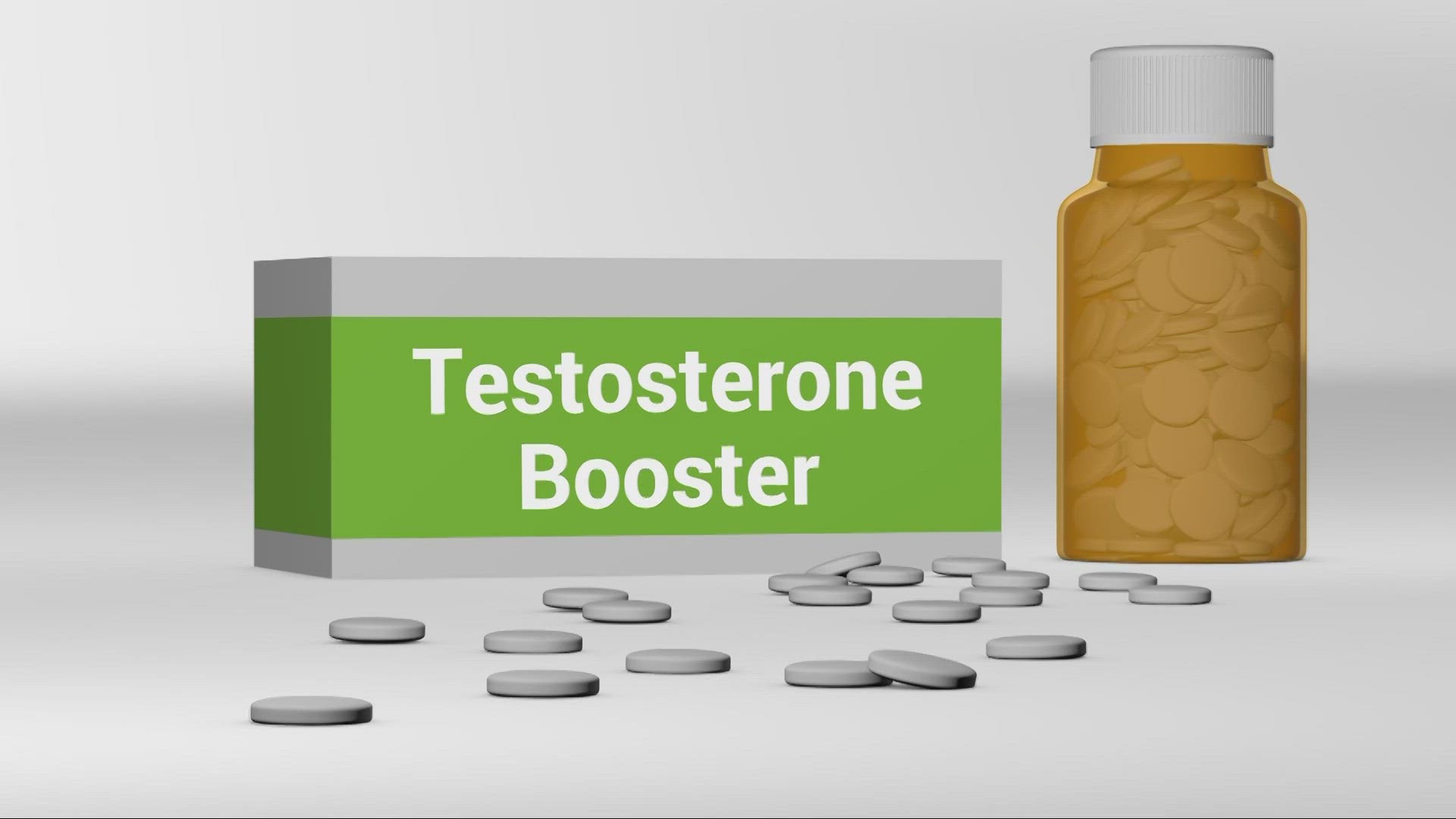CLEVELAND — In 2015, the FDA required a label change on prescription testosterone products. Currently, this is the advisement:
"The U.S. Food and Drug Administration (FDA) cautions that prescription testosterone products are approved only for men who have low testosterone levels caused by certain medical conditions.
"The benefit and safety of these medications have not been established for the treatment of low testosterone levels due to aging, even if a man’s symptoms seem related to low testosterone.
"We are requiring that the manufacturers of all approved prescription testosterone products change their labeling to clarify the approved uses of these medications.
"We are also requiring these manufacturers to add information to the labeling about a possible increased risk of heart attacks and strokes in patients taking testosterone.
"Health care professionals should prescribe testosterone therapy only for men with low testosterone levels caused by certain medical conditions and confirmed by laboratory tests."
A Cleveland Clinic-led trial just released today in the New England Journal of Medicine found that testosterone-replacement therapy did not result in a higher incidence of major adverse cardiac events in middle-aged and older men with hypogonadism (also known as low testosterone) who also had preexisting or a high risk of cardiovascular disease. However, researchers still urge caution when considering testosterone therapy.
The study, called "Testosterone Replacement Therapy for Assessment of Long-term Vascular Events and Efficacy Response in Hypogonadal Men" (TRAVERSE), was presented today during a late-breaking science session at ENDO 2023, the Endocrine Society's annual meeting.
Study author Dr. Steven Nissen — chief academic officer of the Heart, Vascular & Thoracic Institute at Cleveland Clinic — is still concerned that too many men are being over-prescribed testosterone when they likely don't even need replacement therapy.
"Although the trial showed some evidence that testosterone treatment may be safe for men with low levels of testosterone, these findings should not be used as a justification for widespread prescription of these products to large numbers of men," Nissen said.
The issue of low testosterone, or "Low T," for aging men has been a hot topic. Ads seem to be everywhere, and a study published in JAMA Internal Medicine showed prescriptions for testosterone therapy tripled between 2001 and 2011 for men over 40.
It's important to note that testosterone deficiency is not a life-threatening condition, but Nissen says the therapy should only be considered for men who actually suffer from hypogonadism, another term for Low T. Many are being prescribed testosterone who may not need it, and there's concern for the risks associated with levels that are too high.
Another issue is that many men who may have received the prescription because they were dealing with the very common symptoms of fatigue and lack of libido might not be getting properly checked and monitored after receiving a prescription.
The FDA review showed that many men are treated with testosterone products, even though their testosterone blood levels have never been checked. In 2015, the FDA required the makers of testosterone products to "conduct a well-designed clinical trial to more clearly address the question of whether an increased risk of heart attack or stroke exists" for men who take testosterone products.
The TRAVERSE trial was designed to address this FDA mandate. The randomized, double-blind, placebo-controlled study was conducted at 316 clinical-trial sites in the United States and enrolled 5,246 men 45 to 80 years of age who had a preexisting or high-risk of cardiovascular disease and who reported symptoms of hypogonadism.
Patients were randomly assigned to either receive daily 1.62% testosterone gel or placebo gel through the skin. Investigators primarily looked at the time to a composite of death from cardiovascular causes, nonfatal heart attack, or nonfatal stroke.
Results showed that among 5,198 patients who received testosterone or placebo for a mean duration of 22 months, testosterone-replacement therapy did not cause more major cardiac events than placebo.
A major cardiac event occurred in 182 patients (7.0%) in the testosterone group and in 190 patients (7.3%) in the placebo group. However, those receiving testosterone did show a higher incidence of atrial fibrillation, acute kidney injury, and issues arising from blood clots in the veins.
Current guidelines recommend that testosterone should be used with caution in men who have had previous blood clots. Whether or not the FDA decides to update their guidelines remains to be seen.
The study authors reiterate that these findings do not justify testosterone treatment of men who do not have legitimate hypogonadism, and should not be used to imply that large doses misused by athletes and bodybuilders are safe.
Men with low testosterone should not attempt to treat it without the help of a medical professional. They should also be very wary of supplements marketed as "natural" testosterone boosters, because they're not regulated or approved by the FDA.
The TRAVERSE trial was sponsored by a consortium of testosterone manufacturers and was overseen by the Cleveland Clinic Coordinating Center for Clinical Research (C5Research) with support from a contract research organization (Labcorp Drug Development).


